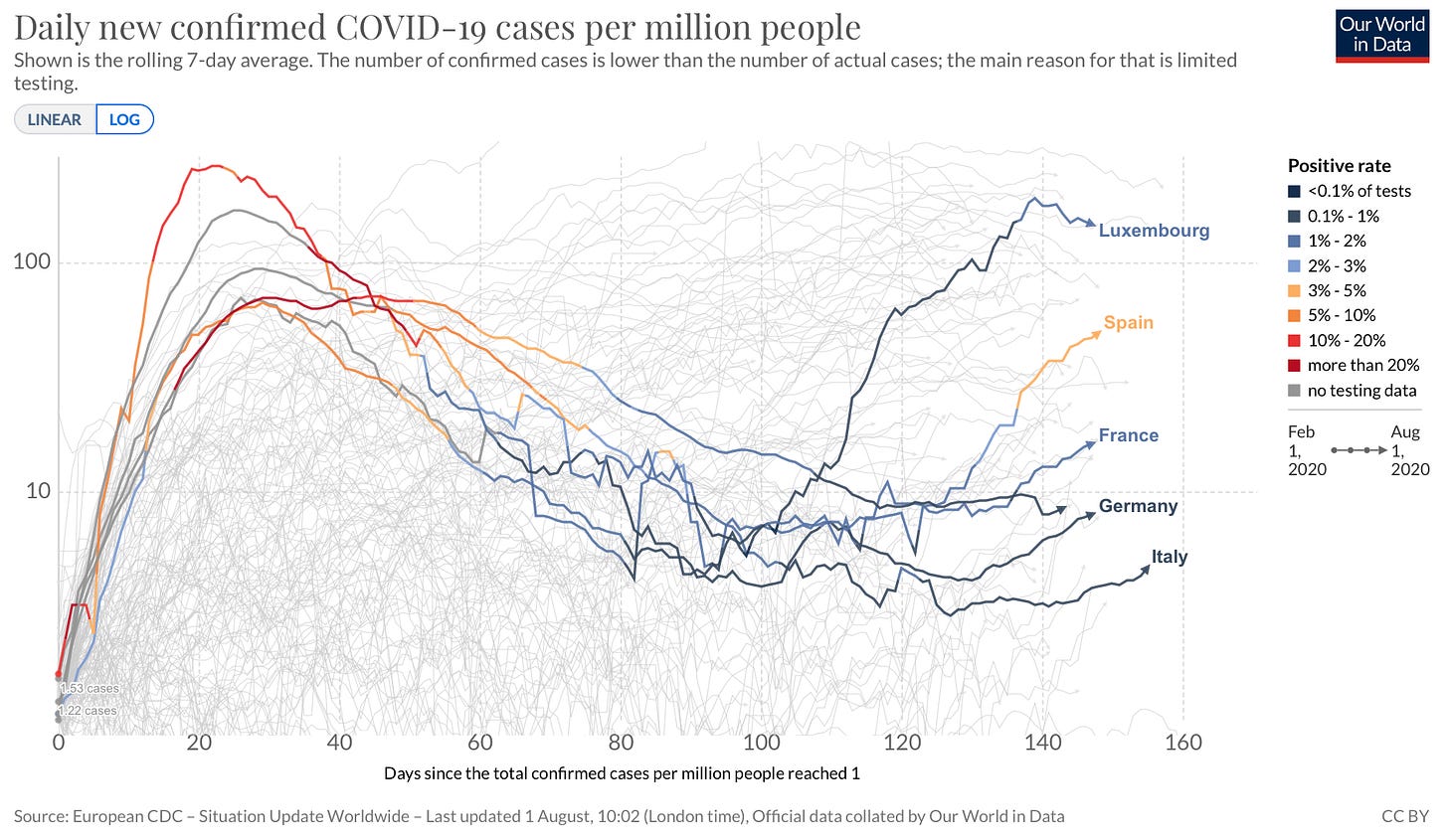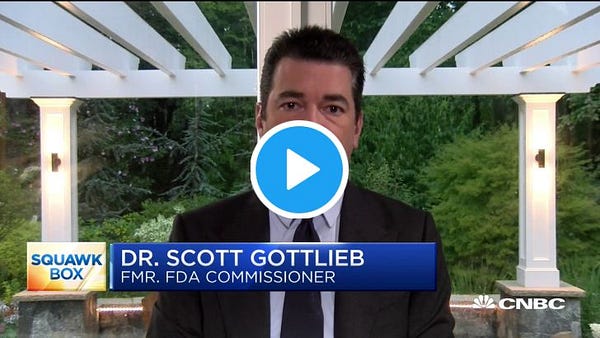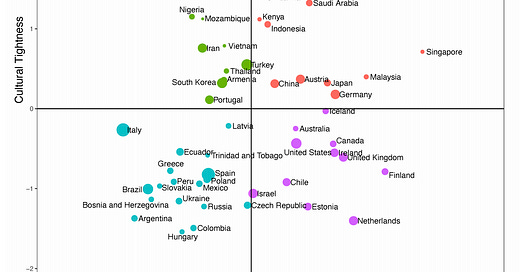🦠 COVID-19 | Learning takes longer than obeying
📊 Daily Data Brief: August 02, 2020, 20:57 GMT (❗️July 27, 2020, 10:02 GMT)
Cumulative case: 18,169,974 (+1,727,477) cumulative cases
Active cases: 6,057,488 (+332,343) (this is the number of currently infected patients)
Total Deaths: 691,252 (+38,646)
Serious/Critical Cases: 65,911 (-355)
Recovered: 11,421,234 (+1,356,498)
Source: Worldometers
1) Seven-day rolling average of new deaths(ECDC data)

NEW❗️ As the UK added Spain (including now the Balearic and Canary islands) to its quarantine list and there are now talks of adding France and Germany, I have decided to add the below the newly confirmed case number per capita chart which also includes test positivity rate in the country line color. I have also added Luxembourg which has been added on July 30 to the quarantine list

Showing a chart from the FT today highlighting the worrying situation in Brazil, Mexico, India and Russia and Iran. Also the FT comparative charts now allow up to 6 countries.

2) US situation ( two NEW❗️charts with more local granularity than Rt numbers and more relevant to school reopenings):
a) COVID risk level tracker from the Harvard Global Health Institute:
Four risk levels explained in this NPR article from July 1 with corresponding policy recommendation for each.

b) The COVID Tracking Project 2 Metrics 7-Day Average Curves (current hospitalisation & death curves)
Currently hospitalised has been chosen as a metric instead of daily cases as testing has significantly increased since the first surge last April in the NorthEast in the US.
We are currently witnessing same level of hospitalisation as then, but less than half the number of deaths.

I used the word optimism in the Corona Daily edition last Monday. I am increasingly optimistic. In the ‘West’ change at scale happens through learning rather than obeying. It is messier and longer but more sustainable.
I also wrote about collective action emerging from corporates, individuals and even governors. In some countries the federal is unfortunately still missing. Optimistic does not mean that the health cost is not huge (or could have been avoided with different leadership) and unlike the flu the long term sequelae of SARS-CoV-2 are anything but like the flu (3 articles today) . But we are on a more positive and sustainable path on dealing with this virus in the West, although it is not showing uniformly in the numbers yet.
It is easy to feel angry, when some of the criticism rightfully and violently directed at leaders is relentless but does not effect the recommended policy or attitude change at all levels of government or community. But the freedom to criticise is a hallmark of liberal democracies, and we are nonetheless starting to see its effects at some government, community and individual level. It is what Bob Wachter outlines in his thread on the response in San Francisco. The article of the day, also looks at how looser culture have been at a disadvantage at the start of the pandemic. And yet authoritarianism is not only not the answer, but is likely to be more damaging in the longer term.
The US is behind for now and decoupling from other democracies (video of the day), but it is leading in science and therapeutics (the UK and Germany are also well positioned).
A whole section on vaccines today. Beyond safety and efficacy, federal government will need to be exceptional to distribute and garner trust of the public for vaccination programs to be successful. It is not a given as both Tom Frieden and Caitlin Rivers warn.
Turning to policy a surprising study on mental health and lockdowns. Also reporting on misleading data on race inequities.
And finally a great educational video on immunity.
🛑 Article of the day: Michele J. Gelfand et al. publish “The Importance of Cultural Tightness-Looseness and Government Efficiency for Understanding Early COVID-19 Growth and Death Rates” in PsyarXiv (Link)
Gelfand et al. explore how culture and government efficiency could potentially explain the different successes around the world against SARS-CoV-2 particularly in the early stage of the epidemic. It is more the framing and preparing discussion which is of interest than the findings summarised in the abstract:
“Multilevel models reveal that nations with tight cultures and efficient governments were the most effective at limiting early COVID-19’s growth and mortality. In the month following the first COVID-19 case, a tight nation with high government efficiency would have 5606·29 fewer cases per million people and 6·2 fewer deaths per million compared with a loose nation with low government efficiency. These results were robust to a number of sensitivity analyses which adjusted for underreporting, demographics, and geopolitical factors.”
Whilst, some (particularly in the US) could be quick to politicise the research, the paper actually points to deeper structural phenomenons at play and potentially shows light a the end of the tunnel for societies whose culture initially puts them at a disadvantage when faced with a pandemic.
One of the key figures in the paper is the one below:

Gelfand et al. rightly identify the need to supplement government and rule abidance with tailored interventions:
“In the quest to enhance government efficiency and social-norm abidance to deal with COVID-19 threats, interventions will need to be tailored to fit differences in countries’ unique circumstances.”
Continuing and focusing on loose culture as the US or the United Kingdom have the authors write:
“Nudging people to follow norms is particularly important in loose cultures, since people in these cultures generally have experienced fewer historical ecological threats and therefore may be more likely to resist increased constraint. Yet such nudges will need to help people maintain a sense of autonomy or they may elicit psychological reactance and backfire.”
Once again some might see absence of nudging in the US as having been detrimental to the response, while others will more realistically look at the end of the paragraph and the risk of backfiring.
The authors are far from advocating government to become autocratic quite the opposite:
“authoritarian responses to COVID-19 may do long term damage to the autonomy and health of nations’ citizens”
Equally, citizens should realise that loose culture might be beneficial outside a pandemic scenario in terms of their autonomy and the ability to innovate. In durably fighting COVID-19, it might be that therapeutics and vaccines emanate from these looser cultures.
Readers might find it interesting to read “Coronavirus shows how to get people to act on climate change – here’s the psychology” in conjunction to the above article and how best to nudge population to norm abidance in a pandemic.
Threads of the day:
🌉 “What we can learn from San Francisco?” by Bob Wachter (Chair of Medicine at UCSF) (Link)
This is a very insightful thread from Wachter who has produced some of the best podcasts and threads on the pandemic since the beginning. Whilst, California and San Francisco (SF) are both experiencing a surge, Wachter rightly lists what the city has done right. There is actually a series of 3 tweets in the 25 tweets threads which stand out where he compares how many cases and then deaths would have been avoided in other cities had they followed the path of San Francisco.


In a country where politicisation of science has been unlike any other countries given the upcoming presidential election in November, it tells a powerful story to learn from. It shows that with strong leadership and actin at state (governor) and city (mayor) level, you can have a significant local impact on the local course of COVID-19.
Wachter is also key to highlight some of the population characteristic of SF to explain the relative success of the city:

It also helps that tech (and not meat packing) is the main employers and that tech CEOs have encouraged work from home early on. Mask wearing compliance has also been one of the highest in the country (estimated at 84%):


And the public health is also one of the best in the country.
Wachter is right to emphasise the local relative success of SF. Whilst some of the context might not apply across the US, it shows that differentiating and strong leadership below the federal level can have substantial impact.
It was an aspect of the pandemic response which a previous edition of the Corona Daily (“ Societal responsibility and hopefully government leadership”) covered highlighting that responsibly and leadership was not in one place.
🇺🇸 “Resetting Our Response: Changes Needed in the US Approach to COVID-19” a thread by Caitlin Rivers introducing a new report she co-authored with colleagues for the The Johns Hopkins Center for Health Security.
Rivers had written previous policy recommendation reports and as she writes on her first tweet it is unfortunately (and maybe unforeseen) to have to write another one:

As Bob Wacher in the previous thread but also suggested by the article of the day, Rivers and her colleagues emphasise that adequate response at all level of government (local, state and federal) are needed and stress the need for collective action to succeed in fighting off this pandemic.
On the vaccine, Rivers makes an often under-reported point:

A great report and summary thread. (Link)
🇺🇸 Video of the day: Scott Gottlieb on “US decoupling from the rest of the world” and its potential negative impact on business and education.


💉Vaccine and Immunity
💉 Tom Frieden writes “The Three Key Hurdles for a Coronavirus Vaccine to Clear” for the Wall Street Journal. (Link)
First, will it work?
Second, will it be safe?
Third, can we get it to people?
In this Op-Ed Frieden echoes Caitlin Rivers. First is step 1 and the two others are steps 2-99.
💉 Derek Lowe writes “Coronavirus Challenges in Primates, Compared” for his “In the Pipeline” blog for Science Translational medicine. Lowe helpfully reports on the positive primate studies of the Moderna, Johnson & Johnson (“Johnson & Johnson’s Coronavirus Vaccine Protects Monkeys, Study Finds” NY Times article and paper) vaccine candidates published this week and compares it to three other vaccine candidates. Of note, the J&J vaccine showed protection with a single-dose regimen. So far so good with vaccine progress. (Link)
🦠 Akiko Iwasaki and Ruslan Medzhitov (Professors of Immunology at Yale) write “Scared That Covid-19 Immunity Won’t Last? Don’t Be” for the New York Times. A great article in an area which has garnered rather sensationally unhelpful coverage till now. The subtitle is a good summary of the case they are making.
“Dropping antibody counts aren’t a sign that our immune system is failing against the coronavirus, nor an omen that we can’t develop a viable vaccine.”
A welcome read. A lot more on immunity in the next edition. (Link)
🦠It is not only a respiratory disease
🌉 Ariel Bleicher and Katherine Conrad write “We Thought It Was Just a Respiratory Virus” in UCSF Magazine. The authors explain how SARS-CoV-2 infects patients, and how far from affecting only the lungs, rips through various organs from ‘head to COVID toes’. A well written and must read article on our current understanding of COVID-19. (Link)
🇪🇸 Miguel Angel Criado writes “Over half of coronavirus patients in Spain have developed neurological problems, studies show” in El Pais. Angel Criado reports on study and publication appearing to suggest that SARS-CoV-2 could be neurotoxic.(Link)
💔 Elizabeth Cooney writes “Covid-19 infections leave an impact on the heart, raising concerns about lasting damage” for STAT News. Cooney reports on two recent publications (here and here) looking at potential heart damages in convalescent and deceased patients respectively. The former should serve as a warning to young people who might not be as careful in protecting themselves (and others) from infection as the infection fatality rate is lower in their age group. At a societal level, widespread and lingering heart damage might have a long lasting cost on the health system even past an eventual end to the pandemic. (Link)
🏛Inequity and mental health
💡 Dr Mark Fabian, Sam Gilbert and Dr Roberto Foa write “Did lockdowns make us happier?” for The Bennett Institute for Public Policy at Cambridge University. Up till now, policymakers and politicians have touted the mental health cost to extending lockdown.
The authors’ study point to a more nuanced and positive effect of lockdown on mental health. While contrary to public messaging around mental health and lockdowns, the authors acknowledge themselves that the potential catastrophic economic recession brought by the pandemic might just start the “real mental health challenge” for both individuals and society. It is nevertheless a worthy and fascinating read. (Link)
❗️ TL Cowger et al. publish “Comparison of Weighted and Unweighted Population Data to Assess Inequities in Coronavirus Disease 2019 Deaths by Race/Ethnicity Reported by the US Centers for Disease Control and Prevention” showing how the CDC methodology under reports racial inequities to the pandemic. (Link)
🎙 Podcast of the day
🦠 “COVID-19 Immunology 101 for Non-immunologists” by Akiko Iwasaki, Ph.D., Professor of Immunobiology at Yale. A very good tutorial on immunology.



